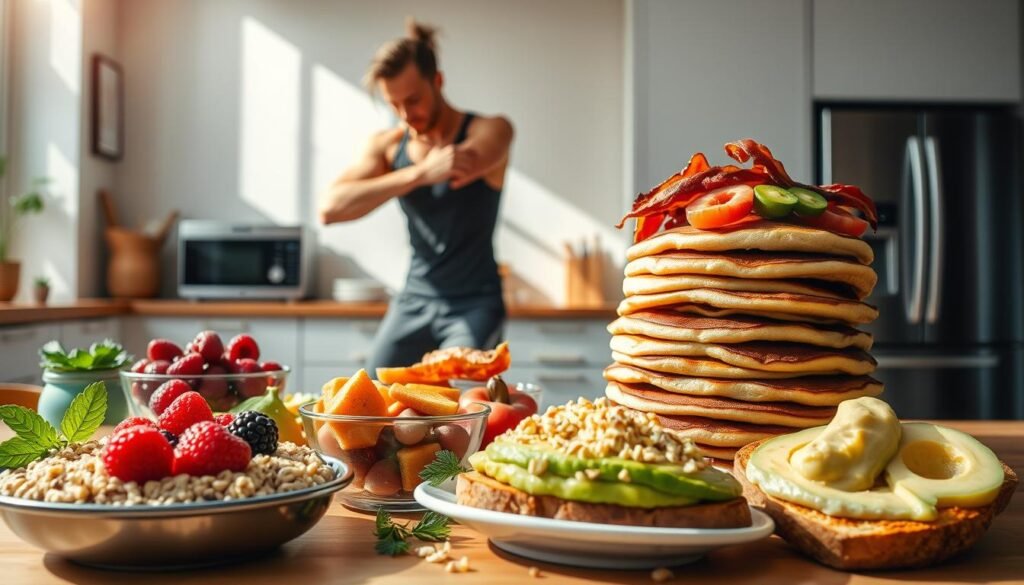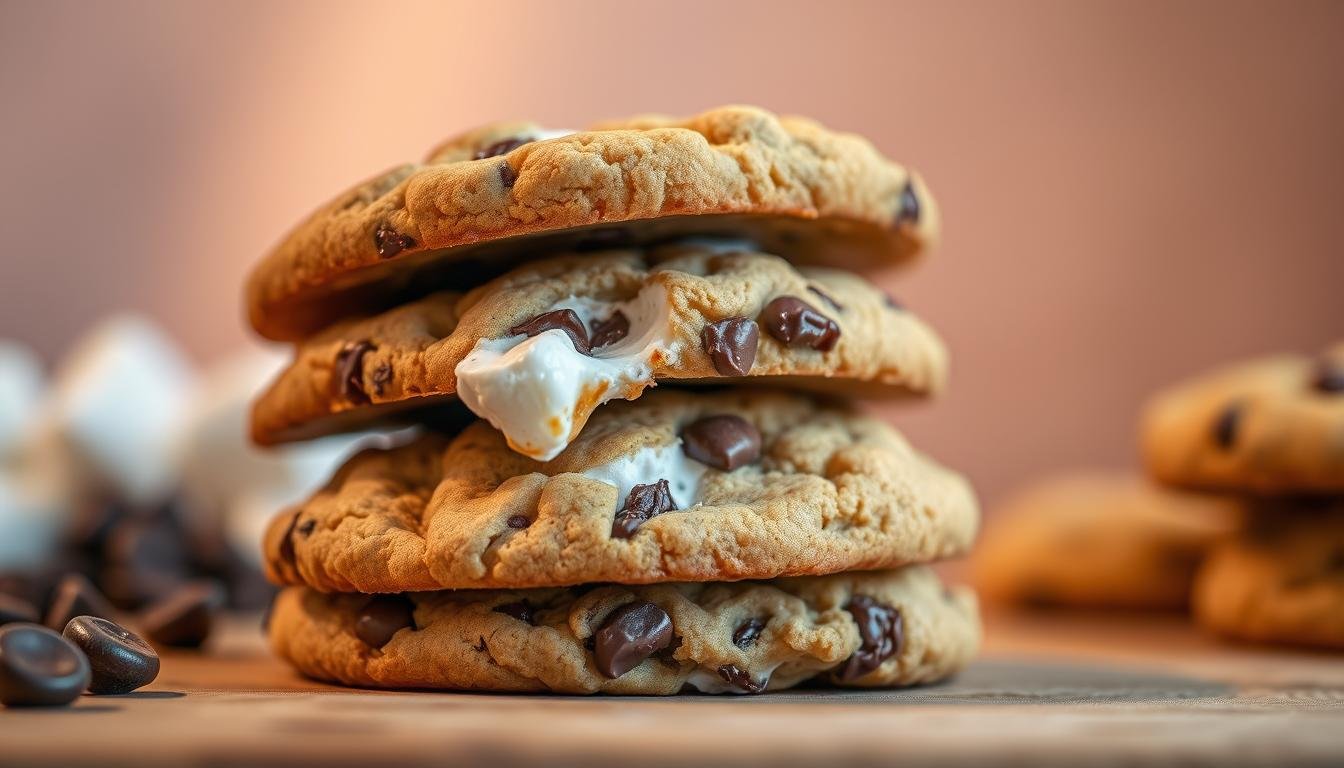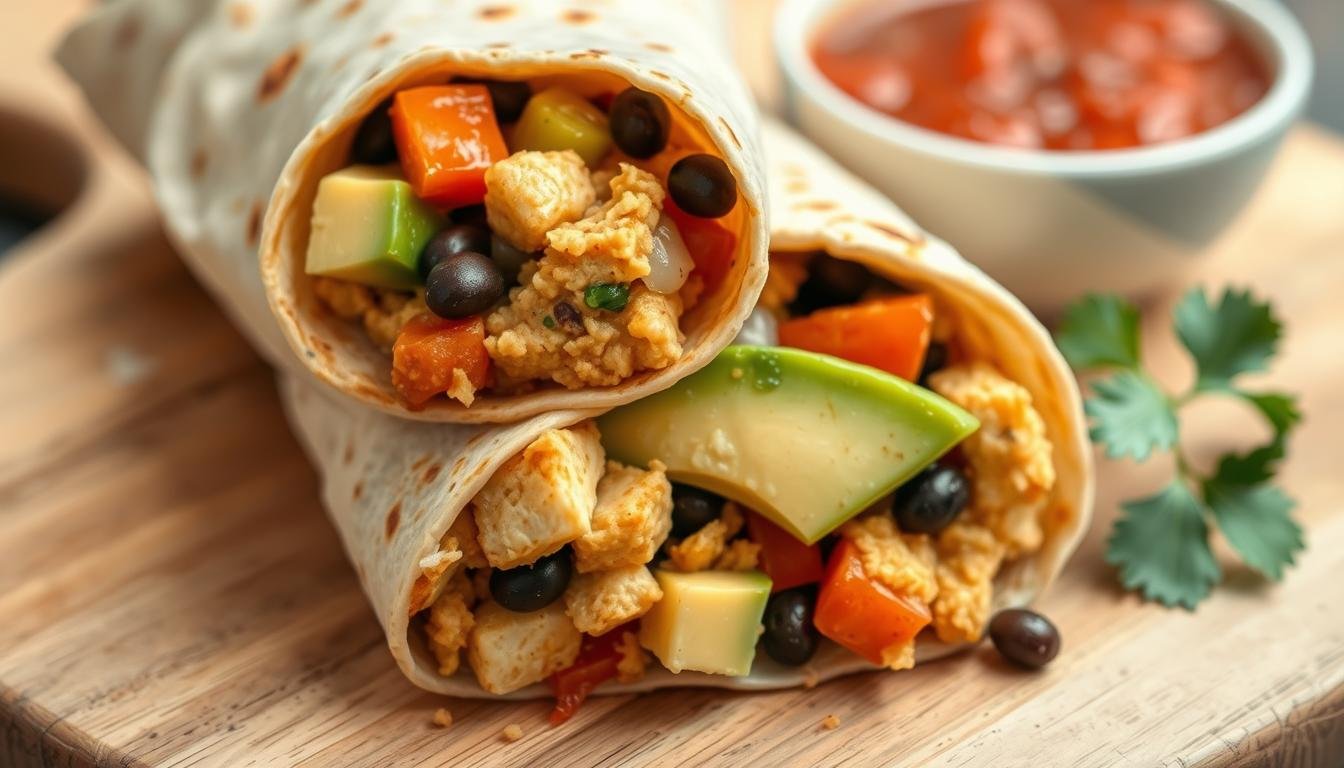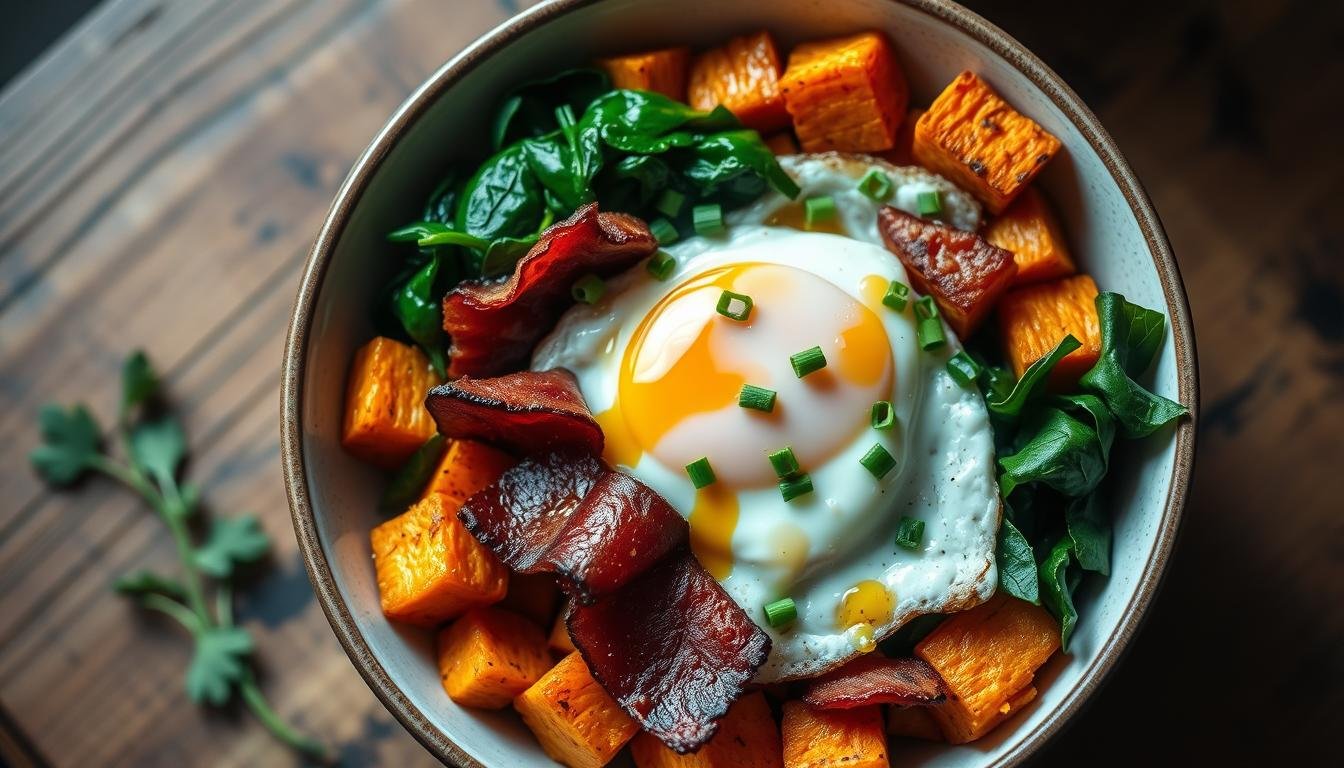I coach athletes and plan my own training days around one simple truth. What you eat at breakfast sets the tone for your workout, practice, or competition. High-energy breakfasts for athletes aren’t about Instagram-worthy bowls. They’re about fueling strength, stamina, and sharp focus when it matters most.
Quick, protein-packed breakfast ideas are key. Think smoothies with whey or pea protein, oatmeal bowls loaded with fruit and nuts, or fast egg scrambles with veggies. These help refill glycogen, kick-start muscle repair, and keep you mentally locked in. I follow sports dietitian guidance that focuses on carbs for fuel and 20–40 g protein at breakfast for recovery. These recipes reflect that balance.
Whether you’re a student juggling classes and early training, a collegiate player, or a weekend warrior, these healthy breakfast recipes for athletes are designed to be practical and performance-driven. Read on to explore all 15 options and make fueling athletes for performance an easy part of your morning routine.
Key Notes;
- Breakfast quality directly impacts energy, recovery, and focus during training.
- Combine carbs, 20–40 g protein, and healthy fats for sustained performance.
- Protein-packed breakfast ideas like smoothies, oatmeal, and egg scrambles are fast and effective.
- These healthy breakfast recipes for athletes suit student, collegiate, and pro schedules.
- Consistent morning fueling is a simple step toward better competition-day results.
Why a nutrient-dense morning meal matters for athletic performance
I think a good morning meal is key for training and recovery. Overnight fasting lowers muscle and liver glycogen. A good breakfast helps restore these stores, improves focus, and cuts down on early tiredness.
Physiological rationale for a high-energy breakfast
Carbs are the main fuel for hard work because they quickly turn into glucose. They fill up glycogen in muscles and liver. Protein helps build muscle and stops it from breaking down after morning workouts. Healthy fats give energy for a longer time but too much can make you feel sick before exercise.
How carbs, protein, and fat work together to fuel training and recovery
A good breakfast for athletes has complex carbs like oats or whole-grain bread. Add 20–40 g of protein from eggs or Greek yogurt. Include healthy fats like avocado for energy. This mix keeps blood sugar stable, helps with recovery, and keeps you going during practice or games.
Timing considerations: pre-workout, post-workout, and game-day windows
For a pre-workout meal 2–4 hours before, choose high-carb, moderate-protein, and low-fat foods. If you’re training soon, pick easy-to-digest carbs to avoid stomach problems. Aim for 1–4 g carbs per kg of body weight, based on how long and hard your workout is.
After working out, eat carbs to refill glycogen and 20–30 g protein to fix muscles. A 3:1 or 4:1 carb-to-protein ratio works well for many endurance activities. On game days, eat familiar, low-fiber, and moderate-carb foods 2–4 hours before. Have a small snack 30–60 minutes before, like a banana or toast with jam.
Good athlete nutrition means adjusting carbs to your workout and listening to your body. Endurance athletes might need more carbs. Stay away from greasy or high-fiber foods right before intense or long workouts to avoid stomach issues and keep your performance up.
High-energy breakfasts for athletes
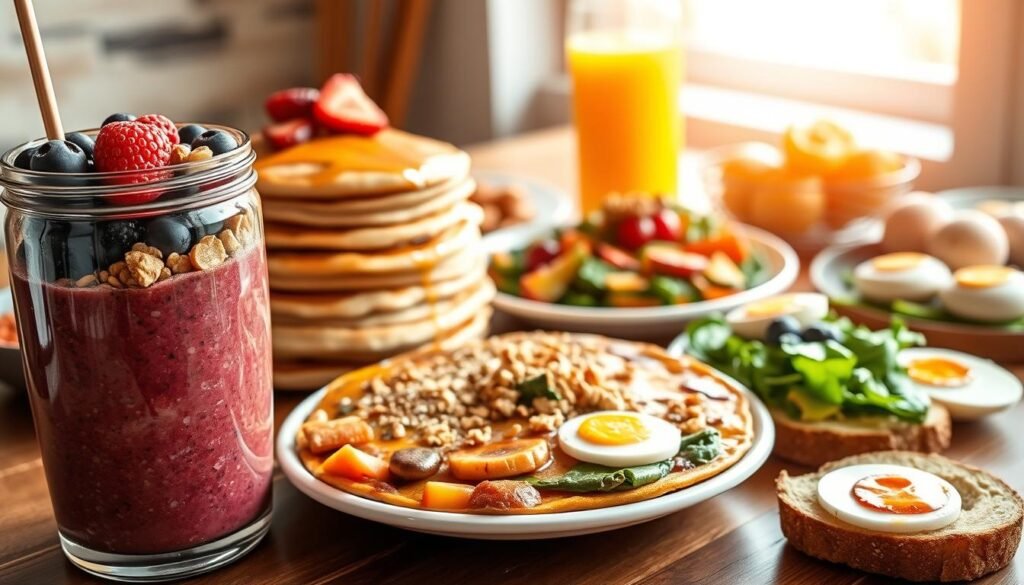
I picked 15 breakfasts for athletes. They offer real food options that meet training needs. These meals include whole grains, fruits, dairy, legumes, eggs, and nuts. They provide balanced carbs, 20–40 g protein, and healthy fats.
How I chose the breakfasts
I looked for meals with carbs, protein, and healthy fats. I chose brands like Bob’s Red Mill oats and Chobani Greek yogurt. This shows athletes can buy these foods easily.
I included both sweet and savory options. I also had vegetarian and vegan choices. This way, all athletes can find something they like.
Meal templates you can scale
I created simple formulas for scaling meals. For light days, aim for 3–5 g carbs and 0.25–0.4 g protein per kg. For hard days, increase carbs to 5–8 g/kg and protein to 0.3–0.5 g/kg.
For strength days, keep carbs at 3–5 g/kg. Increase protein to 0.4–0.6 g/kg. This helps with muscle growth.
Here are examples: a single-serve oatmeal bowl with 6 oz Greek yogurt is good for moderate days. A toasted bagel with nut butter and banana is great for high-carb days. An egg sandwich on a whole-grain bagel with cheese is perfect for strength days.
Food-safety and tolerance tips
When preparing breakfasts, refrigerate perishables within two hours. Use airtight containers for yogurt, eggs, and oats. Test meals during practice to check for stomach issues.
For travel, use instant oats, smoothies, and store-bought yogurt and fruit. This keeps meal prep simple and safe.
Always choose whole foods first. Use protein powders for speed or recovery. These ideas fit into athlete routines without upsetting digestion or convenience.
Comprehensive table of 15 High-Energy Breakfasts for Athletes
| # | Breakfast | Main Ingredients | Approx. Calories | Protein (g) | Carbs (g) | Prep Time | Best For |
|---|---|---|---|---|---|---|---|
| 1 | Overnight Protein Oats | Rolled oats, protein powder, chia/flax, berries, milk/yogurt | 400–500 | 25–30 | 50–60 | 5 min prep, overnight soak | Quick mornings, moderate training |
| 2 | Hot Oatmeal Bowl | Oats, banana, nuts, protein powder, milk | 400–550 | 25–30 | 55–65 | 5–7 min | Pre-workout or recovery |
| 3 | Oat Smoothie Bowl | Cooked/uncooked oats, frozen fruit, protein, milk, granola | 450–600 | 25–35 | 60–70 | 7–10 min | On-the-go, balanced energy |
| 4 | Egg & Veggie Scramble | Eggs/egg whites, spinach, peppers, tomatoes, toast/sweet potato | 350–450 | 20–30 | 30–40 | 10 min | Strength and moderate workouts |
| 5 | Egg Sandwich on Bagel | Eggs, lean turkey/ham, cheese, whole-grain bagel | 400–550 | 25–30 | 45–55 | 5–7 min | Busy mornings, pre-training |
| 6 | Breakfast Pizza | Whole-wheat crust, tomato sauce, eggs, spinach, mushrooms, mozzarella | 450–600 | 25–30 | 50–60 | 15–20 min | Team breakfasts, weekend training |
| 7 | Egg Muffins | Eggs, diced veggies, lean protein | 300–400 | 20–25 | 15–20 | 20 min bake | Portable, meal prep |
| 8 | High-Protein Smoothie (Pre-Workout) | Banana, oats, protein powder, milk | 350–450 | 20–25 | 45–55 | 5 min | Quick pre-workout energy |
| 9 | Post-Workout Recovery Smoothie | Frozen fruit, Greek yogurt, protein, milk | 400–500 | 20–30 | 50–60 | 5 min | Post-training recovery |
| 10 | Greek Yogurt Parfait | Greek yogurt, granola, berries, nut butter | 350–450 | 20–25 | 40–50 | 5 min | Recovery or mid-morning snack |
| 11 | Sweet Cottage Cheese Bowl | Cottage cheese, pineapple/peaches, flax/nuts | 300–400 | 15–25 | 25–35 | 3 min | Easy digestion, light mornings |
| 12 | Savory Cottage Cheese Plate | Cottage cheese, tomato, avocado, toast | 350–450 | 20–25 | 30–35 | 5 min | Balanced macros, lower sugar |
| 13 | Whole-Grain Pancakes | Whole-grain flour, eggs, milk, fruit topping | 400–550 | 20–25 | 50–60 | 10–15 min | Long workouts, endurance |
| 14 | Whole-Grain Waffles | Whole-grain mix, milk, eggs, fruit/yogurt | 400–550 | 20–25 | 50–60 | 10–15 min | Pre-long training or games |
| 15 | Plant-Based Power Bowl | Tofu scramble/beans, quinoa/rice, avocado, seeds, nut butter | 450–650 | 20–30 | 60–70 | 10–12 min | Vegetarian athletes, recovery |
Oat-based breakfasts: oatmeal, overnight oats, and smoothie bowls
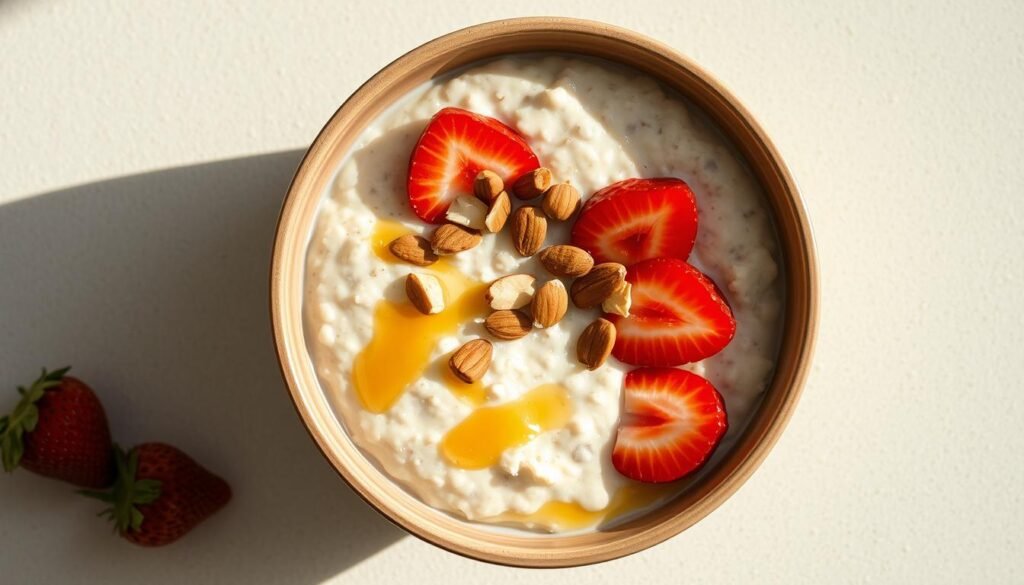
I choose oats for busy mornings because they offer steady carbs and fiber. They also have iron and magnesium. Rolled oats and steel-cut oats release glucose slowly, keeping energy steady.
Pairing oats with Greek yogurt, milk, nuts, or protein powder makes them protein-packed. This supports recovery.
Oats are great for athletes when mixed with fruit and healthy fats. Beta-glucan in oats is good for heart health. The fiber also helps with gut comfort before workouts.
I make oatmeal bowls with banana, dried tart cherries, and almond butter for a high-carb start. This is perfect before long sessions.
Here’s a simple protein overnight oats recipe for meal prep. Mix 1/2 cup rolled oats, 1 scoop whey or 1/2–3/4 cup Greek yogurt, 1/2–3/4 cup milk or milk alternative, 1 tbsp chia or flax, and 1/2 cup berries or sliced banana. Seal in jars and refrigerate overnight for a quick breakfast.
For a hot option, cook 1/2 cup oats in milk. Stir in 15–20 g of whey or plant protein after cooking. Top with nuts and cherries for a 400–600 kcal meal.
For texture and density, I blend smoothie bowls with oats and chia. Mix 1 cup frozen fruit, 1/2 cup cooked or raw oats, 1 scoop protein, and 1/2 cup milk. Top with granola, hemp seeds, and fresh fruit. This gives antioxidants, extra carbs, and a satisfying mouthfeel.
Egg-based options: scrambles, sandwiches, and breakfast pizza
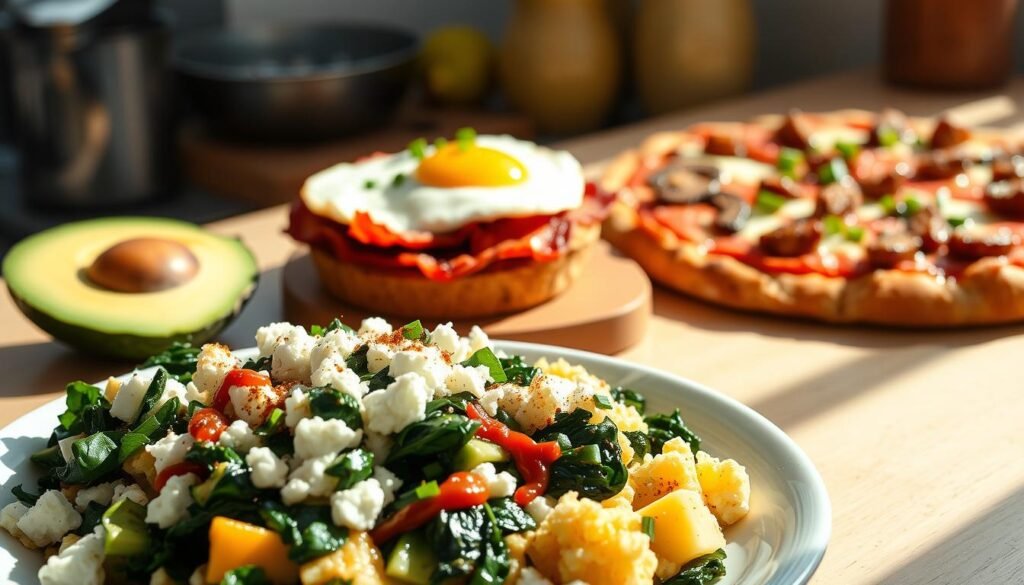
I share egg breakfasts that athletes can count on for performance and recovery. Eggs are packed with protein, choline, and B vitamins. I mix them with whole grains and veggies for a balanced meal without hassle.
For many training days, I suggest a simple egg and veggie scramble. Use 2–3 whole eggs or a mix of whole eggs and egg whites. Add sautéed spinach, bell peppers, and tomatoes. Finish with a slice of whole-grain toast or roasted sweet potato for carbs and fiber.
Scrambled eggs are a favorite because they’re quick to make and can be adjusted based on training intensity. They’re a top choice for athletes needing balanced nutrition.
An egg sandwich or bagel is great for busy mornings. Toast a whole-grain English muffin or bagel. Top it with 2 eggs or 3–4 egg whites, 2 ounces of lean turkey or ham, and a small amount of part-skim cheese for flavor and calcium.
Mandy Tyler advises choosing a bagel size based on carb needs for high-demand mornings. A large bagel can offer 40–60 grams of carbs, perfect for before long workouts or double sessions.
For a savory choice, try breakfast pizza on a whole-grain crust. Start with a whole-wheat base, add tomato sauce, part-skim mozzarella, mushrooms, peppers, and spinach. Crack a few eggs on top and bake until set.
Pair breakfast pizza with fruit or low-fat milk for extra carbs and hydration. This makes a favorite high-protein option that feels indulgent but aids in recovery.
For quick mornings, make egg muffins in a muffin tin. Whisk eggs, add diced veggies and lean protein, bake, then refrigerate. They last 3–4 days and reheat fast for practice or class.
I include these protein-packed breakfast ideas and healthy recipes for athletes in my weekly plan. Each choice supports muscle protein synthesis and steady energy, helping you perform at your best from start to finish.
High-protein smoothies and shakes tailored for athletes
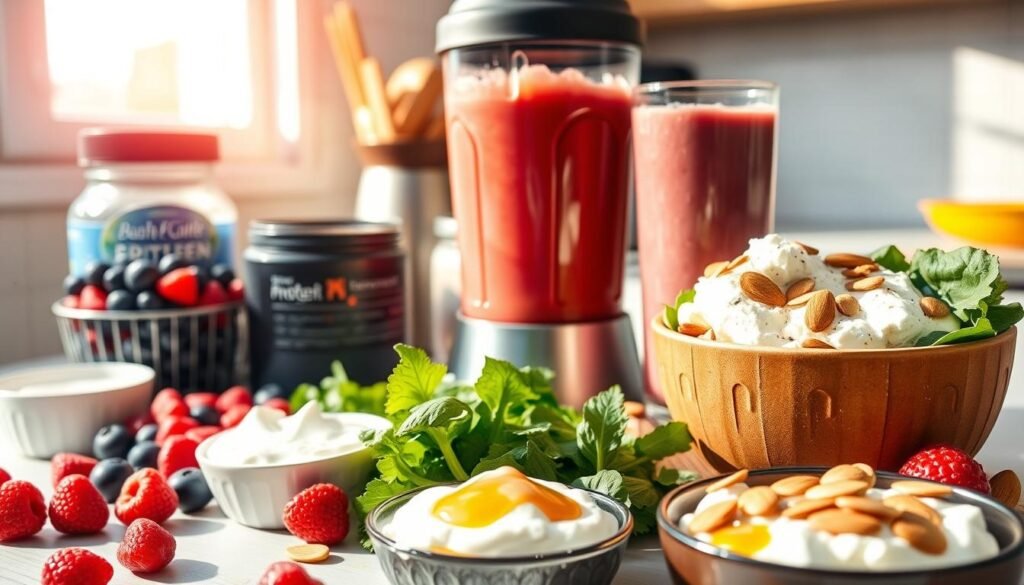
I make smoothies and shakes for athletes with a few goals. I want them to be quick, full of protein, and easy to grab on the go. I mix a liquid base, real fruit, protein, and special add-ins. This makes each drink a great high-protein breakfast or a pre-workout boost.
High-protein smoothie formula: base, fruit, protein source, and add-ins
I start with 8–12 ounces of water, low-fat milk, or unsweetened milk. For carbs, I use banana, berries, or mango. I add oats or dates to get 25–40 g carbs.
For protein, I choose whey, micellar casein, pea, or soy powder. Or, I use plain Greek yogurt. This helps reach 20–40 g protein. For fats and vitamins, I add nut butter, flaxseed, chia, or spinach.
Here are some easy blends: banana + ½ cup oats + 1 scoop whey + 8 oz milk. Or, mixed berries + Greek yogurt + chia + pea protein. These are great for athletes and everyday meals.
Pre- versus post-workout smoothie variations and recommended protein doses
Before working out, I aim for more carbs and moderate protein. I keep fat and fiber low to avoid stomach issues. A good recipe is 1 banana, ½ cup oats, 1 scoop whey, and 8–12 oz low-fat milk.
After working out, I focus on recovery meals. I aim for 20–30 g protein and a high carb-to-protein ratio. Try 1 cup frozen mango, 1 banana, 1 scoop whey, 1 cup low-fat milk, and ½ cup oats for quick refueling.
Portable shake ideas and tips for blending ahead for student and pro athletes
I use portioned dry bags for meal prep. I have pre-measured protein powder, oats, and greens ready to go. Keep dairy separate until you’re ready to mix, or use shelf-stable drinks when you’re on the move.
For convenience, I fill insulated bottles with shakes. This keeps them cool for classes and practice. Use personal blenders and shaker bottles with mesh strainers for quick mixing. Remember to keep pre-blended smoothies in the fridge for 24–48 hours.
Greek yogurt bowls, cottage cheese, and parfaits for recovery
I focus on quick, protein-forward breakfasts for easy recovery after morning sessions. Plain Greek yogurt and cottage cheese are key. They work well with carbs, fruit, and healthy fats to refill glycogen and support muscle repair.
I build parfaits to restore energy, deliver protein, and add micronutrients. Start with 5–7 oz of plain Greek yogurt. Add 1/2–1 cup whole-grain granola and 1/2–1 cup mixed berries or sliced banana. Finish with a tablespoon of almond or peanut butter for healthy fat.
Eating this combo within 30–60 minutes after hard training is best. It helps replace glycogen and build muscle protein. These breakfasts are great for athletes needing quick recovery and energy.
Cottage cheese is a good choice for those who prefer milder flavors or easier digestion. A 1/2–1 cup serving has about 14–28 g of protein. I often mix it with pineapple or peaches and flax for sweet bowls. For savory, I add sliced tomato, avocado, and whole-grain toast.
Below is a comparison to help choose based on goals, digestion, and prep time. Use these examples as templates and adjust portions to fit your body weight and training load.
| Option | Typical Protein | Carb Source | Prep Time | Best For |
|---|---|---|---|---|
| Greek yogurt parfait | 13–20 g per 5–7 oz | Whole-grain granola, berries | 5 minutes | Post-workout recovery meals; quick refuel |
| Protein-boosted bowl (yogurt + protein powder) | 20–35 g depending on scoop | Oats or banana | 5–7 minutes | Higher protein needs; strength athletes |
| Sweet cottage cheese bowl | 14–28 g per 1/2–1 cup | Pineapple, peaches, granola | 3 minutes | Easy digestion; light stomach after morning runs |
| Savory cottage cheese plate | 14–28 g per 1/2–1 cup | Whole-grain toast, tomato, avocado | 5 minutes | Lower sugar option; balanced macros for athletes |
| Yogurt bowl with nut butter | 15–25 g | Banana, oats, nut butter | 5 minutes | Sustained energy; long training mornings |
Whole-grain pancakes, waffles, and French toast with strategic toppings
I look for whole-grain mixes with whole wheat or oats first. Brands like Kodiak Cakes and Krusteaz are good. They offer a high-carb breakfast for athletes with steady glucose.
Portion batter by weight for each serving. This matches training needs. For meal prep, cook pancakes or waffles on weekends. Freeze them with parchment in between. Then, reheat in a toaster or oven for quick breakfasts.
Choosing whole-grain mixes for sustained glucose release
Find mixes with whole grains first and less sugar. Whole grains digest slowly, keeping glucose steady. For early mornings, pair pancakes with banana or berry compote for quick energy.
Protein-boosting toppings: nut butter, Greek yogurt, and cottage cheese
Add 1–2 tablespoons of nut butter, 1/2 cup of Greek yogurt, or 1/2 cup of cottage cheese. This raises protein without losing carbs. A side of egg or turkey sausage is also good. It helps hit protein targets while keeping the meal carb-rich.
Meal-prep and freezer-friendly methods for busy training days
Make a double batch of pancakes or waffles. Cool them fully, then freeze with parchment in between. French toast can be flash-frozen and stored in single portions. Reheat in a toaster oven or conventional oven to keep texture. These steps make meal prep easy and keep mornings efficient during heavy training weeks.
Plant-forward and vegetarian-friendly high-energy breakfasts
I focus on breakfasts that fuel training and are plant-based. These meals have carbs for energy, protein for repair, and are easy to make. They fit vegetarian and plant-based athlete nutrition goals.
Tofu scramble, quinoa bowls, and rice bowls with plant protein
I use firm tofu scrambled with turmeric and nutritional yeast as a protein-rich egg substitute. Add bell peppers, spinach, and onions for extra nutrients. Serve it with quinoa or sweet potatoes for carbs and iron.
A quinoa bowl with 1 cup cooked quinoa, black beans or edamame, avocado, salsa, and almond or peanut butter is balanced. It supports plant-based nutrition and is easy on the stomach before training.
Bean-based burritos and high-carb plant options for endurance training
I make burritos with whole-grain tortillas, beans, brown rice, salsa, and tempeh crumbles. They’re a great, portable breakfast for athletes. For longer training, add more rice or a bagel.
For long sessions, focus on more carbs and 20–30 g protein from legumes or plant protein powder. This helps avoid bonking during endurance work.
Combining legumes, whole grains, and seeds to reach protein targets
I mix lentils, brown rice, and hemp seeds for a complete amino acid profile. Add pumpkin seeds or chia for omega-3s and extra calories. If needed, add pea or soy protein powder to oats or smoothies.
Below is a quick comparison to help plan servings for different training loads and goals.
| Breakfast Template | Main Carbs | Protein Sources | Typical Calories | Best For |
|---|---|---|---|---|
| Tofu scramble + quinoa | 1 cup cooked quinoa | 6 oz firm tofu + black beans | 500–650 kcal | Strength sessions, balanced mornings |
| Bean & rice burrito | 1 cup brown rice + tortilla | 1 cup black or pinto beans + tempeh | 600–800 kcal | Endurance training, long runs |
| Quinoa bowl with nut butter | 1 cup cooked quinoa | Edamame + 1 tbsp almond butter | 450–600 kcal | Recovery breakfasts, moderate workouts |
| Oats + plant protein | 1 cup cooked oats | Pea or soy protein powder + hemp seeds | 400–550 kcal | Student-athletes, quick prep |
| Rice bowl + roasted sweet potato | 1–1.5 cups white or brown rice | Lentils + pumpkin seeds | 550–750 kcal | High-carb breakfast for athletes, long training days |
On-the-go and student-athlete friendly breakfast strategies
I train around classes and travel between practice venues. I keep breakfast simple, portable, and nutrient-dense. This way, I can hit intensity without stomach upset. These tactics focus on athlete meal prep that fits dorms, early labs, and long commutes.
Portable options
I rely on bagel sandwiches with egg or almond butter and a banana. They give me quick calories with carbs and protein. Muffins made from Kodiak Cakes mix or my own batter with whey or plant protein plus oats travel well.
Ready-to-drink protein shakes and blended smoothies in insulated bottles keep me fueled. They are great between early classes and practice.
Quick assembly ideas
I batch overnight oats in jars for three-day rotation. Parfaits layered in clear containers look fresh and grab fast. I wrap breakfast burritos, freeze them, and pull one for reheating.
Egg muffins baked in a tin are compact and rich in protein. I keep frozen fruit, single-serve Greek yogurt cups, and shelf-stable nut butter packets in my sports bag for emergency fueling.
Storing and reheating recommendations
Perishable prepped items like cooked eggs, yogurt, and grains go in the fridge within two hours. I eat cooked items within 3–4 days and pre-blended smoothies within 24–48 hours. Frozen burritos or pancakes reheat well in a microwave, toaster oven, or convection oven.
I aim for a hot internal temperature throughout before I eat. For travel, I pack a small cooler or insulated lunch bag to keep things safe and fresh.
Student-athlete scheduling tip
If a morning class blocks a full meal, I take a small pre-class snack. A banana plus a whey shake gives me energy. Then, I eat a larger post-class meal before training. Planning like this turns athlete meal prep into a reliable rhythm.
| Option | Macros focus | Prep & storage | Best use |
|---|---|---|---|
| Bagel with egg or nut butter + banana | Carbs + protein + healthy fat | Assemble morning of or night before; refrigerate up to 24 hours | Quick pre-class fuel or short-trip breakfast |
| Protein muffins (Kodiak Cakes + protein) | Higher protein, moderate carbs | Bake weekly; refrigerate 3–4 days, freeze for 1 month | Grab-and-go on heavy training days |
| Overnight oats jars | Sustained carbs with added protein | Prep 2–3 jars; store refrigerated up to 3 days | Balanced breakfast when time is limited |
| Frozen breakfast burritos | Customizable macros (eggs, beans, rice) | Freeze individually; microwave from frozen 1–2 minutes then heat through | Early practice mornings or travel days |
| Ready-to-drink shakes / insulated smoothies | Fast protein and carbs | Blend day of when possible; consume within 24–48 hours if refrigerated | Between class and practice, or long commutes |
Balancing meals for different athlete needs: endurance, strength, male vs female considerations
I focus on choices that match training goals and biology. Good athlete nutrition starts with clear targets for carbs and protein. Then, it moves to portioning and food quality. I use examples you can adapt by weight and session demands.
Adjusting carb load for endurance athletes versus power/strength athletes
Endurance athletes need more carbs on heavy days. I recommend aiming toward 6–8 g/kg/day when mileage or long sessions increase. A high-carb breakfast for athletes should include bagels, oatmeal, or rice bowls to top off glycogen before long efforts.
Strength and power athletes benefit from moderate carbs. I suggest 3–5 g/kg/day while prioritizing higher protein around training. For those athletes, breakfasts can be grain-based but portioned smaller, paired with eggs or Greek yogurt for muscle support.
Protein targets and portioning: general guidance (g/kg) and practical examples
I use 1.6–2.2 g/kg/day as a working range for most athletes. Spreading protein evenly across meals helps muscle protein synthesis. Aim for roughly 0.25–0.6 g/kg per meal depending on goals and timing.
Practical example: a 70 kg athlete targeting 1.8 g/kg needs about 126 g protein per day. That often means 20–40 g protein at breakfast. For some athletes I recommend a 30–40 g breakfast when training later in the day.
Sex-specific considerations: energy needs, iron, and micronutrient focus for females
Female athletes often need careful attention to iron, energy availability, and bone health. I advise monitoring iron status and including heme iron sources like salmon and eggs. Pair plant iron with vitamin C to improve absorption.
Energy sufficiency matters more than strict macro ratios for many females. Low energy availability raises risk for RED-S. I encourage adjusting calories and carbs by weight and menstrual status.
Practical takeaways I use: personalize plans, track recovery and training output, and consult a sports dietitian for complex cases. Good nutrition for athletic performance blends sensible carb timing, clear protein targets for athletes, and attention to sex-specific micronutrients.
| Athlete Type | Carb Target (g/kg/day) | Protein Target (g/kg/day) | Breakfast focus |
|---|---|---|---|
| Endurance (long training) | 6–8 | 1.6–2.0 | High-carb breakfast for athletes: oatmeal, bagel, rice bowl + modest protein |
| Endurance (moderate) | 5–6 | 1.6–2.0 | Starchy breakfast with fruit, Greek yogurt, or lean protein |
| Strength/Power | 3–5 | 1.6–2.2 | Protein-forward breakfast: eggs, cottage cheese, protein shake + whole grain |
| Female athlete (general) | Adjust by activity; emphasize adequacy | 1.6–2.2 | Iron-rich choices: salmon, eggs, fortified cereal with fruit for vitamin C |
Conclusion
High-energy breakfasts for athletes are essential, not just extra. A good morning meal has carbs, 20–40 g of protein, and healthy fats. This helps set up your body for training, aids in recovery, and keeps energy steady.
Breakfast should be seen as important fuel, not just something to grab on the go. This guide has 15 breakfast ideas, from oat bowls to protein smoothies. It also includes whole-grain pancakes and plant-based options.
Remember to adjust your breakfast size based on your body and how much you exercise. Choose whole-grain, high-carb foods before long or hard workouts.
Start with simple habits like making overnight oats or egg muffins. Pack a protein shake for quick energy. Aim for 20–40 g of protein in your breakfast.
Test your breakfasts during training to avoid stomach issues. If you need help, talk to a sports dietitian like Stephanie Magill or Mandy Tyler. They can help you fuel up right for your games.
Frequently Asked Questions: High-Energy Breakfasts for Athletes
How do carbohydrates, protein, and fat work together in a high-energy breakfast?
Carbohydrates refill muscle and liver glycogen for energy, protein supports muscle repair and growth, and healthy fats provide sustained energy and support cellular function. Together, they create a balanced meal that fuels training and aids recovery.
How much protein should I aim for at breakfast as an athlete?
Aim for 20–40 grams of protein at breakfast, depending on body weight and training goals. This supports muscle protein synthesis and recovery after morning workouts.
What carb targets should I use for pre-workout breakfasts?
Pre-workout carbs should depend on workout length and intensity. For sessions 2–4 hours away, aim for 1–4 g of carbs per kg of body weight. Choose easy-to-digest complex carbs to fuel energy without stomach discomfort.
What should a post-workout breakfast include for recovery?
Post-workout, include carbohydrates to refill glycogen and 20–30 g of protein to repair muscles. Aim for a 3:1 or 4:1 carb-to-protein ratio. Examples: fruit-and-oat smoothies or Greek yogurt parfaits with granola and fruit.
How can I scale breakfast portions by body weight and training load?
For low-to-moderate training: 3–5 g carbs/kg and 0.25–0.4 g protein/kg. For high-volume endurance: 5–8 g carbs/kg and 0.3–0.5 g protein/kg. For strength/power: 3–5 g carbs/kg and 0.4–0.6 g protein/kg. Adjust portions and snacks accordingly.
Are oats a good base for athlete breakfasts and why?
Yes. Oats provide slow-digesting complex carbs for sustained energy, fiber for gut health, and micronutrients like iron and magnesium. Pairing oats with protein and healthy fats creates a balanced meal for training and recovery.
Can I make protein overnight oats ahead of time for convenience?
Absolutely. Combine oats, protein powder, Greek yogurt, milk, chia or flax seeds, and fruit in jars and refrigerate overnight. Add nuts or nut butter before eating for extra protein and healthy fats.
What are practical portable breakfast options for student-athletes?
Bagel sandwiches with egg or nut butter, protein muffins, overnight oats jars, and pre-blended protein shakes are convenient, nutrient-dense, and travel-friendly options for busy mornings or long commutes.
How do I avoid GI distress when eating before competition or intense training?
Test meals during training to see what works. For workouts under 60–90 minutes, choose low-fiber, low-fat carbs. Avoid greasy or high-fiber foods immediately before events. Small snacks 30–60 minutes prior can help if needed.
What are quick, high-protein smoothie guidelines for athletes?
Use a liquid base (milk or water), add fruit for carbs, protein powder or Greek yogurt, and optional healthy fats like nut butter or chia. Aim for 20–40 g protein and 25–60+ g carbs per smoothie. Adjust carbs and protein for pre- or post-workout timing.
What are smart make-ahead and freezer-friendly breakfast strategies?
Batch-make pancakes, waffles, egg muffins, or breakfast burritos. Freeze in single portions and reheat when needed. Store cooked grains and protein dishes in the fridge for 3–4 days and label portions for quick selection.
Are there female-specific breakfast considerations I should follow?
Female athletes should monitor iron, calcium, and vitamin D. Include heme iron sources or pair plant iron with vitamin C for absorption. Adjust portions based on activity level and consult a sports dietitian for menstrual health concerns.
When should I consult a sports registered dietitian?
Consult a sports RD for personalized fueling strategies, digestive issues, low energy availability, iron or menstrual concerns, or precise macronutrient planning. They provide tailored guidance for your sport, schedule, and goals.

